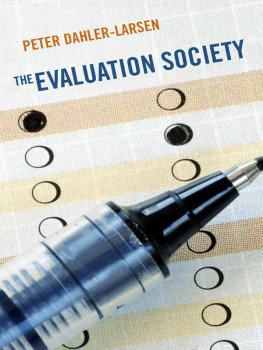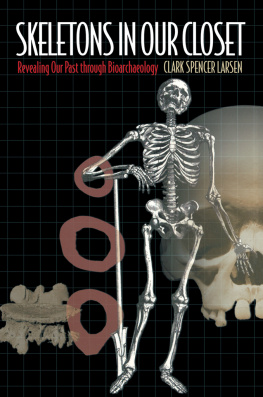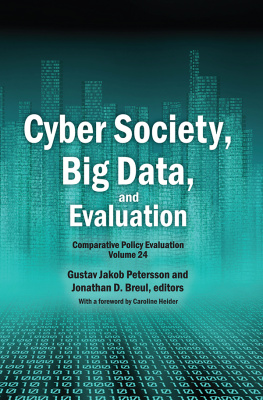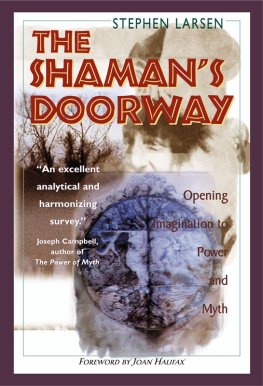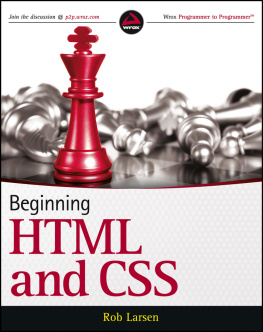Dahler-Larsen - The Evaluation Society
Here you can read online Dahler-Larsen - The Evaluation Society full text of the book (entire story) in english for free. Download pdf and epub, get meaning, cover and reviews about this ebook. year: 2012, publisher: Stanford University Press, genre: Romance novel. Description of the work, (preface) as well as reviews are available. Best literature library LitArk.com created for fans of good reading and offers a wide selection of genres:
Romance novel
Science fiction
Adventure
Detective
Science
History
Home and family
Prose
Art
Politics
Computer
Non-fiction
Religion
Business
Children
Humor
Choose a favorite category and find really read worthwhile books. Enjoy immersion in the world of imagination, feel the emotions of the characters or learn something new for yourself, make an fascinating discovery.
- Book:The Evaluation Society
- Author:
- Publisher:Stanford University Press
- Genre:
- Year:2012
- Rating:5 / 5
- Favourites:Add to favourites
- Your mark:
- 100
- 1
- 2
- 3
- 4
- 5
The Evaluation Society: summary, description and annotation
We offer to read an annotation, description, summary or preface (depends on what the author of the book "The Evaluation Society" wrote himself). If you haven't found the necessary information about the book — write in the comments, we will try to find it.
The Evaluation Society — read online for free the complete book (whole text) full work
Below is the text of the book, divided by pages. System saving the place of the last page read, allows you to conveniently read the book "The Evaluation Society" online for free, without having to search again every time where you left off. Put a bookmark, and you can go to the page where you finished reading at any time.
Font size:
Interval:
Bookmark:
Peter Dahler-Larsen

Stanford University Press
Stanford, California
English translation 2012 by the Board of Trustees of the Leland Stanford Junior University. All rights reserved.
The Evaluation Society was originally published in Danish in 2001 under the title Den Rituelle Reflektion 2001, University Press of Southern Denmark.
No part of this book may be reproduced or transmitted in any form or by any means, electronic or mechanical, including photocopying and recording, or in any information storage or retrieval system without the prior written permission of Stanford University Press.
Special discounts for bulk quantities of Stanford Business Books are available to corporations, professional associations, and other organizations. For details and discount information, contact the special sales department of Stanford University Press.
Tel: (650) 736-1782, fax: (650) 736-1784
Printed in the United States of America on acid-free, archival-quality paper
Library of Congress Cataloging-in-Publication Data
Dahler-Larsen, Peter, author.
[Rituelle reflektion. English]
The evaluation society / Peter Dahler-Larsen ; translated by Steven Sampson.
pages cm
Translated from the Danish.
Includes bibliographical references and index.
ISBN 978-0-8047-7692-9 (cloth : alk. paper)
1. Organizational sociology. 2. EvaluationSocial aspects. I. Title.
HM786.D35 2011
302.13dc22
2011005828
E-book ISBN: 978-0-8047-7812-1
Nothing that anyone had ever measured was still or could ever be the same as before.
To analyze contemporary phenomena is always a Sisyphean challenge. The complexity of the unfolding social world is always greater than our attempts to understand it. The problem is not only complexity itself but our own embeddedness in it. As with all social science, it is like building a boat while being out on the open sea. This problem is especially applicable to our current wave of evaluation, which is comprehensive, uneven, complex, dynamic, and at the same time close to us as a part of the society in which we live.
In this English edition, the material has been revised so that it is internationally illustrative and does not require special knowledge of Danish conditions. The revision and updating of Den Rituelle Reflektion has in fact been the creation of a genuinely new book.
English-speaking readers are invited to consider the idea that not all books in the English language are written from an Anglo-Saxon perspective. Translation is more than a translation of words. For example, I would write that environments demand or institutions think, whereas some would argue that only individuals can demand and think. The differences involved here are related not only to language but to differences in theoretical paradigms.
Books, like movies, are organized in different ways. Some movies have a very clear plot, and the camera focuses on a gun on the table for a long time to show that it plays a key role in the plot. By the end of the movie, we know who the killer was, we are relieved, and we stop thinking. Other movies are complex and winding and mysterious. Some figures have an unclear role in the plot. The idea is to engage the viewer and not be too conclusive. We think of the movie for a long time after we have seen it.
To be honest, I hope my book resembles the latter kind of movie rather than the first one. I hope you find the book enjoyable as it is.
Many people, too numerous to mention, deserve my gratitude for intellectual inspiration. I want to express my gratitude to Mira Rozalis for her constructive review and insightful remarks on earlier versions of the manuscript. One person, Thomas Schwandt, deserves special mention because his intellect and friendship have inspired me in so many ways.
The Evaluation Wave: From Mystery to Analysis
We live in the age of evaluation. In recent years, we have witnessed a boom in evaluation. Today, one can hardly enter a hospital, apply for a job, or seek information at city hall without having to evaluate or be evaluated. Many countries have established centers with full-time staff who do nothing else but evaluateand these centers must themselves be evaluated. It is as if there is no limit to the feedback loops, as if one can look into a mirror that reflects itself in yet another mirror, as if the insatiable evaluation monster demands more and more food every day.
Lise and the Evaluation Wave
Lise is a normal person in a modern, Western country. She works as a school teacher. Here are the evaluations she has been involved in or affected by within a rather short period:
She must provide evaluative input to a semiannual plan of action for each of her pupils.
The grades she has given the pupils are part of a description on the Internet of the quality of her school.
Her pupils are tested, and the results become part of a quality report drafted by the school administration.
She participates in a pedagogical in-service training course and evaluates it.
She is the mother of two children. One of them attends a day care center. Therefore Lise participates in a user-satisfaction survey concerning the quality of the center. She also takes part in a conversation between school and home concerning the childs development (based on grades, pupils work plan, and the teachers oral assessment).
Her husband is a manager. Therefore she participates in a family survey intended to check whether managers under stress remember to take care of their work-life balance and attend to their family life appropriately.
As a teenager, Lise participated in a summer camp. In connection with a fundraising project, this camp now wants to document the long-term effects of the camps philosophy and activities on the individual participants.
Lise is a member of a trade union. It wants to carry out a survey to check member satisfaction with the services they offer.
By the way, Lise wants to quit smoking. The tools available to help her do so have been selected and evaluated by researchers and by the medical industry in ways that Lise does not know.
Todays news is that because of budget cuts, some schools will be closed. Politicians say they will use the quality documentation from the schools in their decision making. Lise never thought the evaluative information she had helped produce would be used in that way.
The modern intuitive feeling that evaluation is spreading is supported by researchers observations of how organizations and authorities operate.
We are well into the kind of process that Hellstern diagnosed back in 1986: evaluation is becoming integrated as administrative routine at many levels and in many types of institutions. Subsequent empirical studies report on intensive (Hansen 2003) and increasing evaluation activity, also internationally (Furubo, Rist, and Sandahl 2002), where evaluation is becoming a taken-for-granted aspect of public administration and organizational procedures for management and development. Individual evaluations are supplemented to an increasing degree by systems that regularly produce indicators and other ongoing evaluation information (Rist and Stame 2006).
Evaluation also fits in as a driving force or supplement to several fashionable formulas for modern organization and administration, among them result-based management, contract management, outsourcing, and benchmarking. Within New Public Management thinking generally, it is believed that evaluation and efficiency measurements are the right ways of controlling public firms (Lane 1993, 132).
Font size:
Interval:
Bookmark:
Similar books «The Evaluation Society»
Look at similar books to The Evaluation Society. We have selected literature similar in name and meaning in the hope of providing readers with more options to find new, interesting, not yet read works.
Discussion, reviews of the book The Evaluation Society and just readers' own opinions. Leave your comments, write what you think about the work, its meaning or the main characters. Specify what exactly you liked and what you didn't like, and why you think so.

